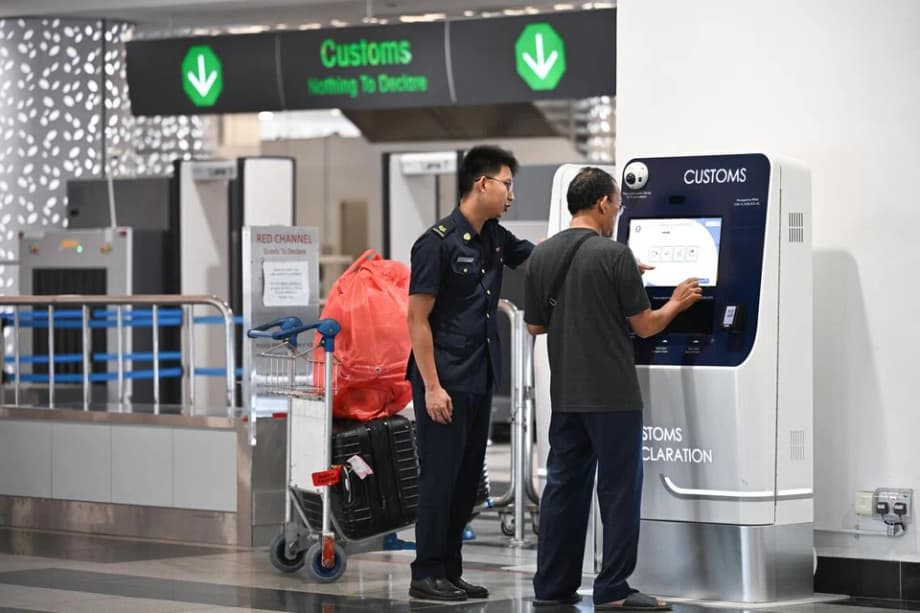Why GST still applies to your holiday shopping
If you plan to shop while overseas, remember that Singapore taxes goods you bring home once you arrive. Goods and Services Tax applies at a rate of 9 percent on items you import into Singapore for personal use when their total value exceeds your personal GST relief. The relief depends on how long you were away. If you were outside Singapore for 48 hours or more, you have a relief of S$500. If you were away for less than 48 hours, your relief is S$100. You pay GST only on the portion above your relief. These rules apply to Singapore citizens, permanent residents and tourists, and they are designed to keep the tax treatment of overseas shopping aligned with what you would pay when you buy in Singapore.
The relief covers new items, souvenirs, gifts and food for personal use. Goods for business or commercial purposes do not qualify. Intoxicating liquor and all tobacco products have separate rules, and GST relief does not cover them. Paying foreign sales tax or VAT overseas does not remove the requirement to pay GST in Singapore. If you purchased items at duty free shops in Singapore before a trip and then bring them back after your travel, they will still count toward your GST relief when you re-enter. GST is based on the price you paid, so keep receipts and invoices. If you do not have a receipt, Singapore Customs will assess the value based on similar goods.
The government’s fact-check site explains why this rule exists. GST is a consumption tax that applies when the goods are consumed in Singapore, including items you hand carry across the border.
Factually, a government information site, explains the principle behind the tax:
GST is a tax on the consumption of goods or services in Singapore.
This is why the relief exists for travellers but only up to a limit, and why you must declare goods when your purchases exceed that limit.
How the GST relief works
The relief applies to each traveller and is based on the time spent outside Singapore before arriving. The value is the total of all new articles, souvenirs, gifts and food for personal use that you bring in your luggage. You cannot split a single item to fit the limit. If the total exceeds your relief, you pay 9 percent GST on the excess amount. The relief does not apply to intoxicating liquor, tobacco products or goods for sale.
Who gets relief and who does not
Travellers are eligible for relief unless they fall into excluded groups. The relief does not apply to the following:
- Holders of employment passes
- Holders of work permits
- Holders of student passes
- Holders of dependant passes
- Holders of long term passes
- Transport crew members
If you belong to one of the above categories, you must declare and pay GST on taxable goods you bring into Singapore with no personal relief. Goods for commercial purposes are not covered by relief, regardless of who carries them.
What counts toward the limit
New items, souvenirs, gifts and food for personal use all count toward your limit. Second hand items bought overseas count as purchases, so they are included in your total at the price you paid. Used personal belongings that you already owned before leaving Singapore do not count, provided you can show they were yours before the trip. Receipts from local purchase, warranty cards, or photos with date and location metadata can help show prior ownership. If you have no receipt for a purchase or for a gift, Customs will determine the value by reference to identical or similar goods.
Liquor, tobacco and duty free
There is no GST relief for intoxicating liquor and tobacco. Liquor may qualify for a separate duty free concession if you are 18 or older, spent 48 hours or more outside Singapore, are not arriving from Malaysia, and the liquor is for personal use. Typical options include combinations such as up to 2 liters of wine, or 1 liter of spirits with 1 liter of wine, or up to 2 liters of beer. Tobacco and cigarettes have no duty free concession and are always subject to duty and GST. These concessions cannot be used for sale or gifting and are subject to eligibility checks at arrival.
Calculating what you owe
Start with the total price paid for all your overseas purchases that qualify as personal goods. Subtract your GST relief based on your time away. Apply the 9 percent rate to the remainder. GST is based on the purchase price in Singapore dollars. If you paid in a foreign currency, conversion to Singapore dollars follows the exchange rates that the authorities use (rates published by the Monetary Authority of Singapore).
- Example 1: You were away for 6 days and spent S$800 in total on personal goods. Your relief is S$500, so the taxable amount is S$300. GST payable is S$27.
- Example 2: You were away for 36 hours and spent S$1,200. Your relief is S$100. The taxable amount is S$1,100. GST payable is S$99.
- Example 3: You were away for a week and bought a bag for S$2,000. You used it during the trip. The item is still considered newly purchased. With S$500 relief, GST is charged on S$1,500, which is S$135.
No receipt, gifts or second hand buys
If you do not have a receipt or invoice for a purchase, Singapore Customs will assess the value based on identical or similar goods on the open market. Gifts are treated the same as purchases for valuation, so include their value in your total. Second hand items bought overseas are valued at their transacted price. Keep digital and paper receipts and any proof of payment. Photos or emails from the seller and online order confirmations are useful backup.
Declaring and paying the tax
The simplest way to comply is to declare and pay before you arrive. You can submit a declaration and make payment up to three days before arrival using the Customs@SG web application. Once payment is confirmed, you can exit via the Green Channel on arrival and show your digital receipt if asked. If you did not declare in advance, approach the Red Channel or the Tax Payment Office at the checkpoint to declare and pay on the spot. Keep all invoices and receipts ready for quick checks.
One declaration rule and packing tips
Declare all your overseas purchases in one submission. Keep high value items and their receipts together at the top of your luggage so you can present them quickly. Store digital copies of receipts and payment confirmations on your phone or in cloud storage. This helps speed up checks if officers need to verify values or dates.
Proving items were owned before your trip
To show that a bag, camera or watch was already yours before you left, bring a local receipt or warranty card where possible. Dated photos taken in Singapore, or photos with time and location metadata, can also be persuasive. Customs officers assess each case individually, so clear documentation reduces delays.
What happens if you do not declare
Failure to declare taxable goods or making an incorrect declaration can result in a composition amount of up to 20 times the GST due, with a minimum of S$50. For serious offences under the Customs Act and the GST Act, the courts may impose a fine up to S$10,000 or an amount equal to the tax payable, whichever is greater, and or imprisonment for up to 12 months. Fraudulent evasion of GST can lead to a fine up to 20 times the amount of tax evaded and or imprisonment for up to two years. Officers conduct selective checks at land, air and sea checkpoints, so keeping receipts and declaring early is the safest path.
Singapore Customs and the Inland Revenue Authority of Singapore reminded travellers in a joint press statement (2019) that compliance is each traveller’s responsibility. They stressed both the duty to declare and the consequences of getting it wrong.
It is the responsibility of travellers to make an accurate and complete declaration of the dutiable and taxable items in their possession. Failure to declare or making an incorrect declaration constitutes an offence under the Customs Act and the GST Act.
Enforcement drives often pick up cases involving luxury goods, collectibles, and liquor exceeding allowances. Honest declarations prevent delays at checkpoints and avoid costly penalties.
Common myths and FAQs
I used the item overseas, do I still pay?
Yes. If you bought a bag, watch or jacket overseas, it is counted as a new purchase even if you wore or used it during the trip. The item’s value still goes into your total, and GST applies to any amount above your relief.
I paid foreign VAT overseas, do I still pay GST in Singapore?
Yes. GST is a tax on consumption in Singapore, so foreign VAT paid does not remove your obligation to pay GST here. If you received a VAT refund overseas, you still need to pay GST in Singapore where the item will be consumed.
Do I need to declare gifts?
Yes, gifts count toward your total. If a friend gives you a present overseas and you bring it home, include its value. If no receipt exists, Customs will value it based on identical or similar goods and charge GST on the amount above your relief.
How are online purchases shipped to Singapore treated?
All goods imported into Singapore are subject to GST, whether you carry them yourself or they arrive by air or post. The low value goods regime means GST applies to many items bought from overseas sellers, even at lower values, when shipped in. The personal GST relief discussed in this article applies to goods you carry in when you travel, not to goods imported through shipping or delivery. Always keep records of your orders and any GST collected at checkout.
Travel smart to avoid problems
- Track your spending and keep a running tally of the total value of goods you plan to bring home.
- Keep all receipts and invoices. Save digital copies and email confirmations to your phone.
- Declare and pay early using the Customs@SG web application if you expect to exceed your relief.
- Know the liquor concession rules and remember there is no concession for tobacco or cigarettes.
- Pack items that need declaration in an easy to reach part of your luggage along with their documents.
- Do not remove tags or packaging to try to avoid checks. Officers can assess value even without tags.
- Use official exchange rates to estimate GST in Singapore dollars and set aside funds for payment.
- When in doubt, approach the Red Channel or the Tax Payment Office and ask. Declaratory honesty is safer than risking penalties.
Official resources and where to ask
For the most current rules, check these official pages and keep them bookmarked before you travel:
- GST relief and arrivals guide from Singapore Customs: customs.gov.sg
- Travellers bringing goods into Singapore, IRAS guidance: iras.gov.sg
- Government explainer on GST for overseas purchases: factually.gov.sg
Key Points
- GST on hand carried goods is charged at 9 percent on the value exceeding your personal relief.
- Relief is S$500 if you were away 48 hours or more, and S$100 if you were away less than 48 hours.
- Employment, work permit, student, dependant, long term pass holders and crew do not get GST relief.
- Relief does not cover liquor and tobacco. Liquor has separate duty free concessions with conditions. Tobacco has no concession.
- Gifts and second hand items bought overseas count toward your total. Used belongings owned before travel are excluded with proof.
- Declare and pay up to three days before arrival via the Customs@SG web application or at the Red Channel.
- No receipt is not an exemption. Customs will value the goods based on similar items.
- Failure to declare can lead to a composition amount up to 20 times the GST due, and severe cases may face fines or prosecution.












